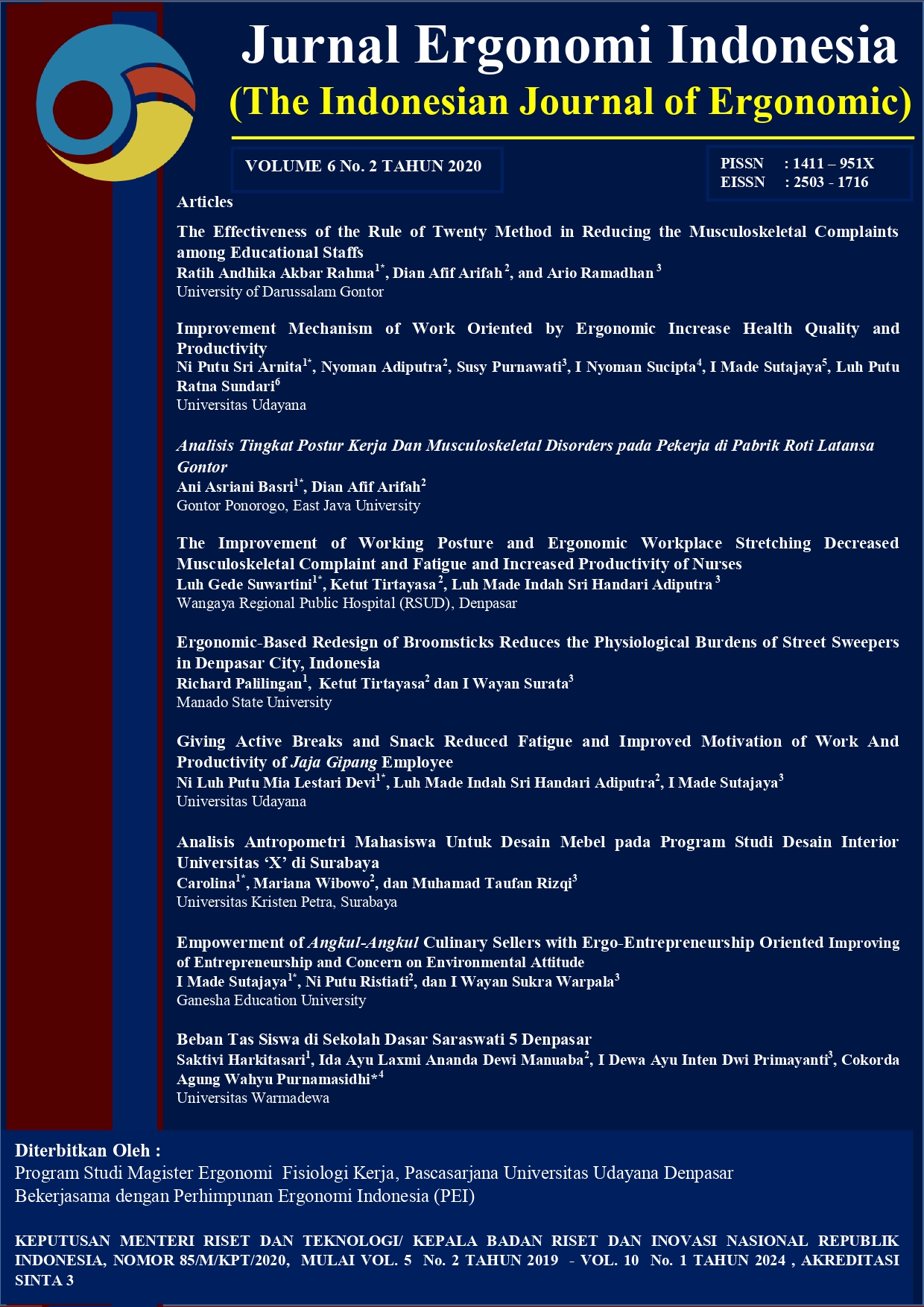Empowerment of Angkul-Angkul Culinary Sellers with Ergo-Entrepreneurship Oriented Improving of Entrepreneurship and Concern on Environmental Attitude
Abstract
The culinary delights that are sold in front of the house entrance gate (angkul-angkul) are currently starting to develop rapidly in Peliatan Village, Ubud, Gianyar, Bali. The research objectives are: (1) to prove that empowerment of angkul-angkul culinary ergo-entrepreneurship oriented can improve entrepreneurial and environmental care attitudes and (2) to know how to solve ergonomic and entrepreneurial problems faced by culinary sellers. This quasi-experimental research used the same subject design. The subjects were 25 angkul-angkul culinary sellers who were randomly selected from 37 available populations. The independent variable in this study is the empowerment of angkul-angkul culinary with ergo-entrepreneurship orientation. The dependent variable is an entrepreneurial attitude and an environmental care attitude which is recorded before and after empowerment. The data obtained were analyzed using paired t test at a significance level of 5%, because the data were normally distributed. The results showed that the entrepreneurial attitude of sellers increased by 20.13% and the attitude of caring for the environment increased by 20.01% and the obstacles faced related to the empowerment of sellers were more technical and economic in nature which could be overcome through awareness programs. The conclusion is that the empowerment of angkul-angkul culinary with ergo-entrepreneurship orientation can significantly improve entrepreneurial attitudes and environmental care attitudes (p <0.05).
Downloads
References
Chen, T. B. and Chai L. T. 2010. Attitude towards the Environment and Green Products: Consumer Perspective. Management and Science Engineering. Vol. 4(2):27-39.
Choi, G.H. and Byoung, G. 2017. Control of Industrial Safety Based on Dynamic Characteristics of a Safety Budget-Industrial Accident Rate Model in Republic of Korea. Journal Safety and Health at Work. Vol. 8(2):189-197.
Fullemann, D., Rebecca, B., Gregor, J. J.and Georg F. B. 2016. Individual and Group-level Job Resources and Their Relationships with Individual Work Engagement. Journal of. Occupational Health. Vol. 58:255-268.
Gohari, P., Kamkar, A., Jafar, S., Hosseinipour, Zohoori, M. 2013. Relationship Between Rewards and Employee Performance: A Mediating Role of Job Satisfaction. Interdisciplinary Journal of Contemporary Research in Business. Vol. 5(3).
Julina. 2013. Determinan Perilaku Pembelian Ekologis dan Konsekuensinya Terhadap Lingkungan: Perspektif Konsumen di Kota Pekanbaru Berdasarkan Kolektivisme, Perhatian Terhadap Lingkungan, Efektivitas Konsumen, dan Kesediaan Membayar. Kutubkhanah Jurnal Penelitian Sosial Keagamaan. Vol. 16(2):115-126.
Kim, C. and Youngtae, C. 2015. Working Conditions and Leisure-time Physical Activity among Waged Workers in South Korea: A Cross-Sectional Study. Journal of Occupational Health. Vol. 57:259–267.
Lee, K. 2011. The Green Purchase Behavior of Hong Kong Young Consumers: The Role of Peer Influence, Local Environmental Involvement, and Concrete Environmental Knowledge. Journal of International Consumer Marketing. Vol. 23(1):21-44.
Lee, J.J., Moon, H.J., Lee, K.J., Kim, J.J. 2014. Fatige an related factor among Hotel Workers: The Effects of Emotional Labor and Non-Standard Working Hours. An Occupational Environmental Medicine Journal; Vol. 26:51. Doi: 10.1186/s40557-014-0051-y.
Lea, M. Naczenski1, J.D., Madelon, L. M. V. H. and Michiel, A. J. K. 2017. Systematic Review of the Association between Physical Activity and Burnout. Journal of Occupational Health. Vol. 59:477-494.
Manuaba, A. 2015. Total Ergonomic Approach to Anticipate Multidimensional Development Problems. Ergonomic Seminar 2015. Bali: Udayana University.
Moeloek, N.F. 2016. Peraturan Menteri Kesehatan Republik Indonesia Nomor 39 Tahun 2016 tentang Pedoman Penyelenggaraan Program Indonesia Sehat Dengan Pendekatan Keluarga. Jakarta.
Ojima, J. 2017. Decline of the Performance of a Portable Axial-flow Fan due to the Friction and Duct Bending Loss of a Connected Flexible Duct. Journal of Occupational Health. Vol. 59:210-213.
Purwanti, D. 2017. Pendidikan Karakter Peduli Lingkungan dan Implementasinya. Dwijacendekia - Jurnal Riset Pedagogik. Vol. 1(2):14-20.
Rini, A.S., Sukaatmadja, I P.G., dan Giantari, I G. A.K. 2017. Pengaruh Pengetahuan Lingkungan dan Kepedulian Lingkungan terhadap Sikap dan Niat Beli Produk Hijau“The Body Shop” di Kota Denpasar. E-Jurnal Ekonomi dan Bisnis Universitas Udayana. Vol. 6(1):137-166.
Saleh, S. Susan, W., dan Anila, B.. 2017. The Use of Noise Dampening Mats to Reduce Heavy-Equipment Noise Exposures in Construction. Journal Safety and Health at Work. Vol. 8(2):226-230.
Sutajaya, I M. dan Gunamantha, I M. 2014. Pemberdayaan Masyarakat Melalui Usaha Kuliner Lokal untuk Mengembangkan Sikap Kewirausahaan dan Meningkatkan Pendapatan Pedagang Kaki Lima di Desa Peliatan, Ubud, Gianyar. Laporan Penelitian. Universitas Pendidikan Ganesha.
Sutajaya, I M., Ristiati, N.P. Suryanti, I.A.P. 2016. Penerapan IPTEKS melalui Pelatihan Ergo-Entrepreneurship untuk Mengembangkan Sikap Kewirausahaan Pedagang Kuliner di Desa Peliatan Ubud Gianyar Bali. Laporan P2M. Universitas Pendidikan Ganesha.
Sutajaya, I M & Warpala, I W.S. 2017. Pengembangan Wisata Rurung Bersih dan Hijau (Lane Clean and Green Tourism) Berorientasi Ergo-Entrepreneurship untuk Meningkatkan Sikap Kewirausahaan dan Kepedulian Masyarakat terhadap Kondisi Lingkungan. Laporan Penelitian. Jurusan Pendidikan Biologi. FMIPA. Undiksha.
Sutajaya, I M. 2018. Ergonomi. Rajawali Pers, Depok: PT. Rajagrafindo Persada.
Thepaksorn, P., Supawan, T., Salee, I., Wattasit, S., Kouji, H. and Akio, K. 2017. Job Safety Analysis and Hazard Identification for Work Accident Prevention in Para Rubber Wood Sawmills in Southern Thailand. Journal of Occupational Health. Vol. 59:542-551
Tsuno, K., Norito, K., Akihito, S., Kyoko, S., Akiomi, I. and Michael, P. L.2017. Workplace Incivility in Japan: Reliability and Validity of the Japanese Version of the Modified Work Incivility Scale. Journal of Occupational Health. Vol. 59:237-246.
Wei, L.T. dan Yazdanifard, R. 2014. The Impact of Positive Reinforcement on Employee’s Performance in Organization. American Journal of Industrial and Business Management. Vol. 4:9-12.
Wikipedia, 2012. Kewirausahaan. [Cited 2012 September 10] Available at http://id.wikipedia.org/wiki/Kewirausahaan
Yumang, R.D.J. dan Burns, C., 2014. Shift Work and Employee Fatigue: Implications for Occupational Health Nursing. Sage Nursing, Health, and Nutrition Journal. Vol. 62(6):256-261.

















